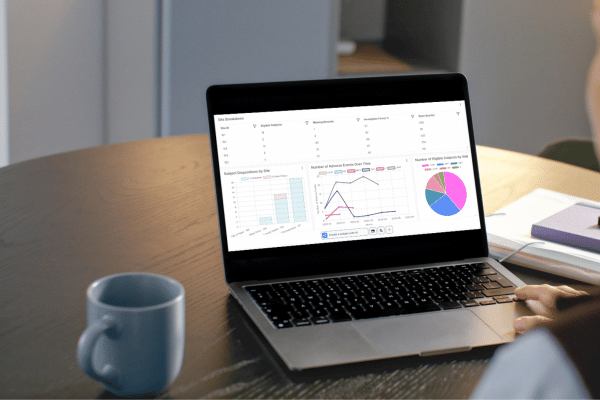Electronic data capture (EDC) is commonly used in today’s clinical trials, but some teams still stick with manual methods or aren’t making the most of the tools they have. Modern EDC systems make it easier to collect and monitor data in real time, with greater speed, accuracy, and security. They help cut down on errors and lighten the administrative load. Here’s a quick look at how EDC works, why it’s important, and the difference it can make in your studies.
What Is Electronic Data Capture (EDC)?
EDC is a digital method of collecting and managing clinical trial data. It replaces paper forms with electronic case report forms (eCRFs), allowing investigators to enter participant data directly into a secure online system. This data can come from a variety of sources, including clinical visits, patient-reported outcomes, and wearable devices that support remote monitoring.
Why Some Researchers Still Rely on Manual Data Capture
Even with all the advantages EDC offers, some researchers still use paper forms or spreadsheets to collect data. These older methods might feel comfortable or seem easier to set up at first, but they come with plenty of drawbacks.
Manual entry increases the risk of transcription errors, delays data access, and complicates audit readiness. For teams juggling complex protocols or tight timelines, these drawbacks can slow progress and increase the risk of costly mistakes.
How EDC Systems Improve Clinical Trials
Faster Data Collection and Real-Time Access
EDC platforms help close the gap between collecting data and actually being able to use it. With direct data entry and built-in tools, study teams can see and work with information as soon as it comes in. Thanks to APIs and cloud-based access, it’s also much easier to build, manage, and adjust studies on the fly.
Reduced Errors and Greater Accuracy
EDC systems come with built-in checks that catch common mistakes right when the data is entered. Automatic edit checks and logic rules help keep everything clean and consistent, which leads to better data quality and stronger patient safety. These tools play a big role in helping trials stay on track and deliver better outcomes.
Safe and Secure Data Collection
Today’s EDC systems are built to keep your data safe and compliant from the start. With features like encryption, role-based access, audit trails, and support for regulations like GDPR and HIPAA, they offer a level of security that paper-based methods just can’t match.
Streamlined Workflow and Reduced Administrative Burden
Moving to EDC cuts down on paperwork and makes documentation a lot easier to handle. Built-in tools for tracking and reporting help streamline tasks like managing submissions, responding to queries, and handling serious adverse events (SAEs), so teams can stay focused on the work that matters most.
Improved Collaboration and Oversight
Cloud-based access and real-time visibility make it easy for teams to stay connected, whether they’re working from the sponsor side, the CRO, or directly at the site. Everyone, from investigators and monitors to data managers, can collaborate using the same up-to-date information, helping avoid confusion and delays. Role-based permissions keep things secure by ensuring each team member has the right level of access.
Easy Setup
Many EDC platforms now come with drag-and-drop tools that make it easy to build forms and workflows. No coding or technical background is needed. That means study teams can make updates on the fly, even mid-study, without waiting on IT support or pausing progress. TrialKit is one example of a platform designed to make setup and adjustments quick, flexible, and user-friendly.
What You Can Do with EDC Software
EDC software is built to support all kinds of clinical research, from small, specialized rare disease studies to large, global pharmaceutical trials; traditional, site-based studies, and hybrid designs using remote data collection. Whether you’re tailoring workflows for a complex protocol or managing multiple sites across regions, EDC gives you the flexibility to move quickly, stay organized, and meet compliance requirements along the way.
Choosing the Right Electronic Data Capture System
Not all EDC platforms are the same. When evaluating platforms and partners, look for features that support:
- Integration with other tools and platforms
- User-friendly interfaces
- Built-in compliance with global regulations
- Mobile and remote access options
TrialKit EDC checks all these boxes. Built to support clinical trials of any size or complexity, TrialKit offers intuitive design tools, mobile access, and integration-ready architecture that grows with your needs. Explore the full platform.
FAQs About Electronic Data Capture (EDC)
What is the difference between EDC and eCRFs?
Electronic data capture (EDC) refers to the entire system or platform used to digitally collect and manage clinical trial data. Electronic case report forms (eCRFs) are specific forms within the EDC system used to record participant data. In short, eCRFs are a component of the broader EDC infrastructure.
Is EDC required for all clinical trials?
No, EDC is not currently mandated for all clinical trials, but it has become the industry standard due to its advantages in accuracy, speed, and compliance. Regulatory bodies like the FDA strongly encourage its use for efficient data handling and audit readiness.
How does EDC improve data accuracy?
EDC platforms include built-in validation rules, logic checks, and data formatting controls that reduce human error during data entry. This ensures more consistent, structured, and complete data, which ultimately enhances the integrity of the clinical trial.
Can EDC be used in decentralized clinical trials?
Yes, EDC systems are essential in decentralized trials. They support remote data entry by participants and sites, integrate with wearable devices, and allow study teams to monitor data in real time from any location, improving flexibility and accessibility.
Is it difficult to train staff to use an EDC system?
Most modern EDC systems are designed to be user-friendly, with intuitive interfaces and minimal technical requirements. Training typically involves short onboarding sessions, and many platforms provide in-app guidance, help centers, and customer support.
How secure is EDC data?
EDC platforms use advanced security measures such as encryption, secure cloud storage, role-based access control, and audit trails. These features help protect sensitive trial data and ensure compliance with global regulations like GDPR and HIPAA.
Can EDC integrate with other clinical systems?
Yes, many EDC platforms are designed to integrate with other eClinical systems such as CTMS (clinical trial management systems), ePRO (electronic patient-reported outcomes), and lab data platforms. These integrations streamline data flow and reduce duplication.




